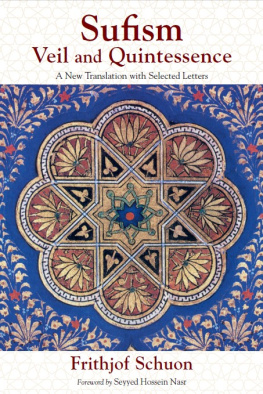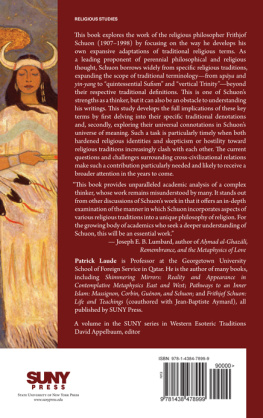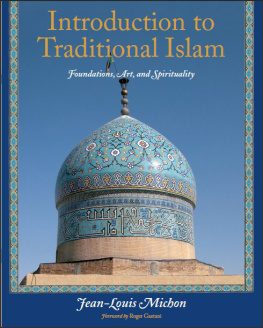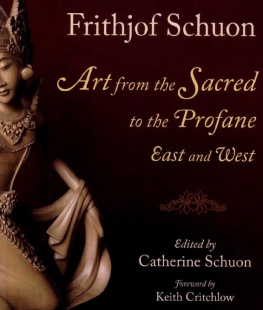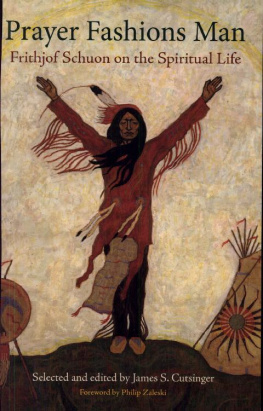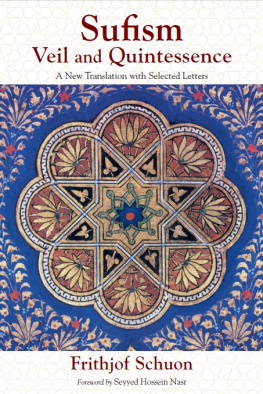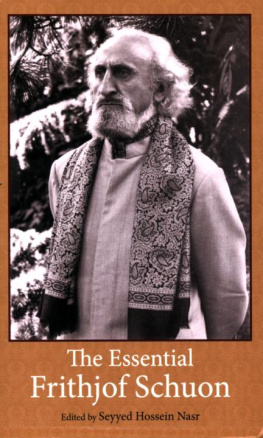APPENDIX
Selections from Letters and
Other Previously Unpublished Writings
1
How is Tasawwuf to be defined? One Sufi has said that Tasawwuf is poverty; another has said it is fasting; still another has said it is the five prayers and awaiting death. These are pious associations of ideas; they are not definitions.
If we were asked what Tasawwuf is, we would say it is (1) Discernment between the Real and the illusory, (2) permanent Remembrance of the Real, and (3) Beauty of soul, conformity to the Real.
Discernment between the Real and the illusory: between al-Haqq, the True, and al-hijab, the veil; la ilaha illa 'Llah. This is Hikmah, the wisdom mentioned by the Koran: He (Allah) giveth wisdom unto whom He will, and he unto whom wisdom is given, he hath truly received abundant good (Surah The Cow [2]:269).
Permanent Remembrance of the Real: Dhikru 'Llah. As the Koran says: And the Remembrance of Allah is of all things the most great (Surah The Spider [29]:45).
Beauty of soul, conformity to the Real: for God loves all BeautyJamalsince it reflects His Infinitude, His Harmony, His Goodness, and His Beatitude; and He particularly loves Beauty of soul since the inward takes precedence over the outward, and the immortal over the perishable. Hadith: Verily Allah is beautiful, and He loveth Beauty.
2
Say: Allah! then leave them to their vain discourse. Thus it is that the Dhikr cuts through the Gordian knot of the souls obscurities and troubles, its states of heaviness and dispersionin short, the inward problems that appear insoluble, whether their causes are objective or subjective or both at once.
This means that the Dhikr cuts through the inextricable and absurd knot of lower maya, which is found in the microcosm as well as the macrocosm, in the soul as well as the world.
Man tends to argue with his own absurdity as well as with that of the world, and the adversary, who has an interest in our having troubles and forgetting God, takes advantage of the situation by involving us in an indefinite movement; this is what is called going round in circles. Now what we do not understand, God under stands, and we attest to this fact by saying Allah and turning away from all discussion about the uncertain, conjectural, indefinite, insoluble. In any event, it is necessary to know that there is always an unintelligible point in maya: on the higher plane it is mystery, and on the lower it is the absurd; in one case as in the other we say Allah.
To say Allah is to show Confidence and Faith. For Allah is the reply to everything; the soul is a question, and the supreme Name the response; or the soul is a wound, and the Supreme Name a balm.
3
What distinguishes us above all from Muslim-born or converted individualspsychologically, one could sayis that our mind is apriori centered on universal metaphysics (Advaita Vedanta, Shahadah, Risalat al-Ahadiyah) and the universal path of the divine Name (japa-yoga, nembutsu, dhikr, prayer of the heart); it is because of these two factors that we are in a traditional form, which in factthough not in principleis Islam. The universal orthodoxy emanating from these two sources of authority determines our interpretation of the shari'ah and Islam in general, somewhat as the moon influences the oceans without being located on the terrestrial globe; in the absence of the moon, the motions of the sea would be inconceivable and illegitimate, so to speak. What universal metaphysics says has decisive authority for us, as does the onomatological science connected to it, a fact that once earned us the reproach of de-Islamicizing Islam; it is not so much a matter of the conscious application of principles formulated outside of Islamism by metaphysical traditions from Asia as of inspirations in conformity with these principles; in a situation such as ours, the spiritual authorityor the soul that is its vehiclebecomes like a point of intersection for all the rays of truth, whatever their origin.
One must always take account of the following: in principle the universal authority of the metaphysical and initiatic traditions of Asia, whose point of view reflects the nature of things more or less directly, takes precedencewhen such an alternative existsover the generally more theological authority of the monotheistic religions; I say when such an alternative exists, for obviously it sometimes happens, in esoterism as in essential symbolism, that there is no such alternative; no one can deny, however, that in Semitic doctrines the formulations and rules are usually determined by considerations of dogmatic, moral, and social opportuneness. But this cannot apply to pure Islam, that is, to the authority of its essential doctrine and fundamental symbolism; the Shahadah cannot but mean that the world is false and Brahma is true and that you are That (tat tvam asi), or that I am Brahma (aham Brahmasmi); it is a pure expression of both the unreality of the world and the supreme identity; in the same way, the other pillars of Islam (arqan al-Din), as well as such fundamental rules as dietary and artistic prohibitions, obviously constitute supports of intellection and realization, which universal metaphysicsor the Unanimous Traditioncan illuminate but not abolish, as far as we are concerned. When universal wisdom states that the invocation contains and replaces all other rites, this is of decisive authority against those who would make the shari'ah or sunnah into a kind of exclusive karma-yoga, and it even allows us to draw conclusions by analogy (qiyas, ijtihad) that most Shariites would find illicit; or again, should a given Muslim master require us to introduce every dhikr with an ablution and two raka'at, the universaland antiformalistauthority of japa-yoga would take precedence over the authority of this master, at least in our case. On the other hand, should a Hindu or Buddhist master give the order to practice japa before an image, it goes without saying that it is the authority of Islamic symbolism that would take precedence for us quite apart from any question of universality, because forms are forms, and some of them are essential and thereby rejoin the universality of the spirit.
4
I am glad to learn you have finally desisted from fasting, for the body needs all its strength when it is ailing, that is, one needs strength to eliminate an ailment that risks establishing itself if it can profit from a weakening and lack of resistance. In short, one has the right to be prudent, especially at our age; there are fuqara? who are not so, although our perspective does not require any quasi-heroic zeal on the plane of the shari'ah; the emphasis being on the Dhikr.
5
A word presupposes silence: it cannot be heard in the midst of noise. Silence must be perfect to the extent the word is noble. This is why dhikr requires faqr: the Name Allah is fully pronounced only if the soul is extinguished for it.
When there is extinction of soul there is virtue. The soul is virtuous when it is as God created it: vices are privations, or they are superimposed defects. The primordial soulextinguished, silentis the lotus (padma) that contains the jewel (mani); it is this lotus the Blessed Virgin personifies. She is the peace (salam) that conveys blessing (salat). Or she is the holy silence (hesychia) that contains the divine Word (Logos), the Name.

